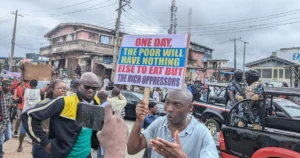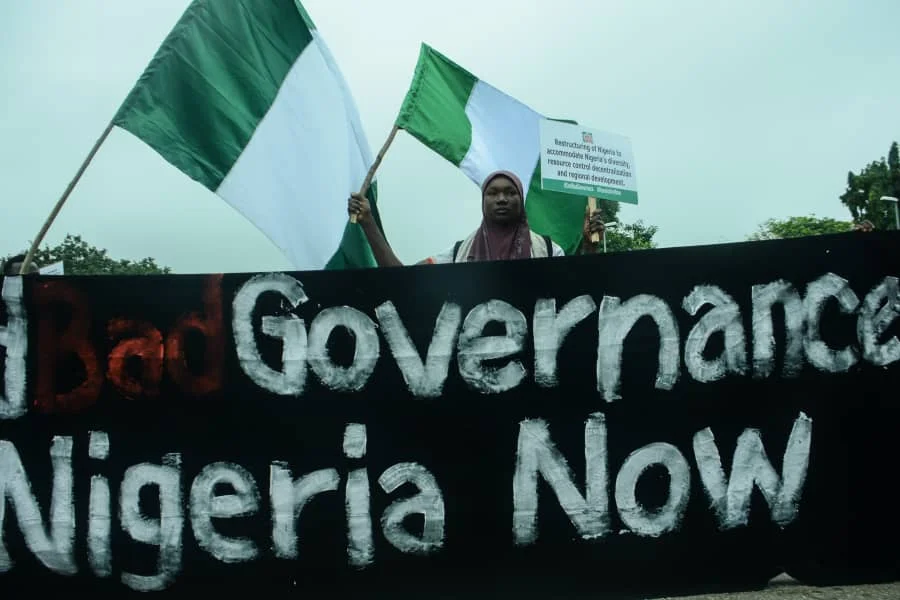Widespread demonstrations triggered by Nigeria’s worsening economic crisis escalated into chaos, resulting in multiple fatalities, numerous arrests, and the imposition of curfews across several states. The unrest erupted as citizens took to the streets to protest the skyrocketing cost of living, which has been intensified by the removal of fuel subsidies and unrelenting inflation.
The demonstrations, which quickly spread from major urban centres to smaller towns, saw clashes between security forces and protesters, leading to tragic outcomes in various locations. The federal and state governments struggled to contain the growing unrest as public frustration boiled over.
Fatalities and Injuries Reported Amid Crackdown
Reports from civil rights groups and local authorities confirmed that at least seven people lost their lives during clashes with police and security operatives. In Kano, Lagos, and Ibadan, some demonstrations turned violent after police deployed tear gas, rubber bullets, and live ammunition to disperse crowds.
In Kano State, three people were reportedly killed during a confrontation between security agents and demonstrators who blocked roads and set tires ablaze. In Lagos, protests around Ojota and Agege degenerated into chaos, leaving several injured and resulting in the death of one protester. Meanwhile, in Oyo State, protests in Ibadan led to further violence and a heavy security clampdown.
Eyewitnesses reported indiscriminate arrests of both peaceful protesters and bystanders. Legal advocacy organizations condemned what they described as a heavy-handed response to citizens exercising their democratic rights.

Curfews Imposed Across Multiple States
In response to the growing violence, several state governments imposed temporary curfews and movement restrictions to prevent further breakdown of law and order.
-
Kano State announced a dusk-to-dawn curfew, citing the need to maintain public safety.
-
In Lagos, the state government deployed additional police and military personnel to “critical hotspots” and warned residents against assembling in large numbers.
-
Kaduna and Rivers States also tightened security surveillance and placed limits on public gatherings.
These curfews sparked criticism from civil society organizations, who argued that the government was using security measures to silence legitimate dissent rather than address the root causes of the protests.
Economic Conditions Continue to Worsen
The unrest stems from deteriorating living conditions in the wake of President Bola Tinubu’s fuel subsidy removal, which led to a sharp increase in petrol prices—from about ₦185 to over ₦500 per litre. This hike has had a domino effect on food prices, public transportation, electricity, and rent.
Inflation surged to double digits, eroding the purchasing power of ordinary Nigerians. With salaries stagnating and basic goods becoming unaffordable, many households now struggle to afford even one meal a day.
Markets across Nigeria reported sharp drops in patronage as consumers prioritized only essential items. For many, the government’s decision to phase out subsidies without adequate social protection left them financially stranded.
Arrests Spark National and International Outcry
Human rights organizations reported that hundreds of protesters had been arrested across the country, including youth activists, student union leaders, and journalists covering the events. Groups such as Amnesty International Nigeria and SERAP (Socio-Economic Rights and Accountability Project) condemned the mass arrests and called for the immediate release of all unlawfully detained individuals.
Social media erupted with hashtags like #FreeTheProtesters, #EndBadGovernance, and #JusticeForVictims, drawing attention to the government’s response to the crisis. International observers and rights monitors have also raised concerns over the use of force by law enforcement.
Government Appeals for Calm as Tensions Remain High
In a nationwide address, government officials urged citizens to remain calm, promising that measures were underway to alleviate the economic burden. President Tinubu reiterated his earlier announcement of ₦8,000 monthly support for 12 million vulnerable households over six months. However, many Nigerians dismissed the move as a token gesture that fails to reflect the severity of the crisis.
The Nigeria Labour Congress (NLC) and other unions warned of a possible nationwide strike if the government failed to implement more impactful relief programs. Civil society coalitions have also demanded that government officials cut down on luxurious spending and channel funds toward addressing the needs of struggling citizens.
A Nation at a Crossroads
As demonstrations continued into the night in parts of Abuja, Benin, Enugu, and Jos, Nigerians called for far-reaching reforms. They emphasized the need for leadership that listens, plans, and protects the people during economic transitions.
The protests serve as a stark reminder of the consequences of policy decisions made without adequate public consultation or cushioning support. For many, the current unrest is not just about fuel or inflation—it is a cry against governance that leaves the majority behind.
The question now remains whether the government will act decisively to calm the storm or continue down a path that may plunge the nation into deeper instability.







